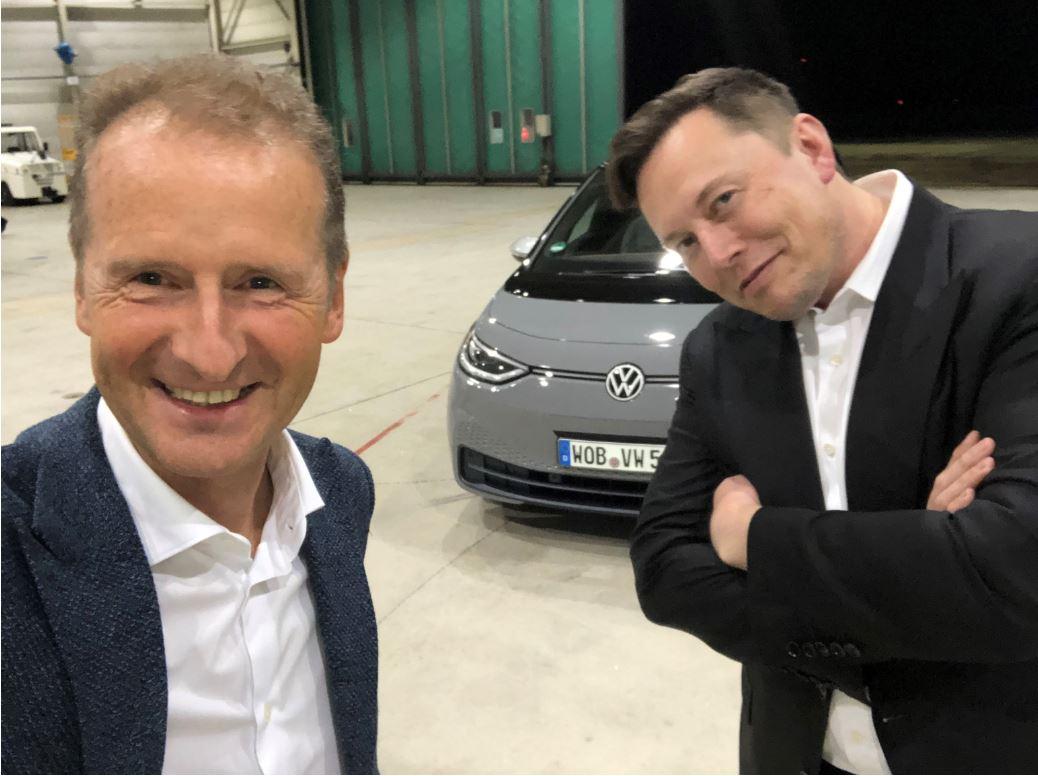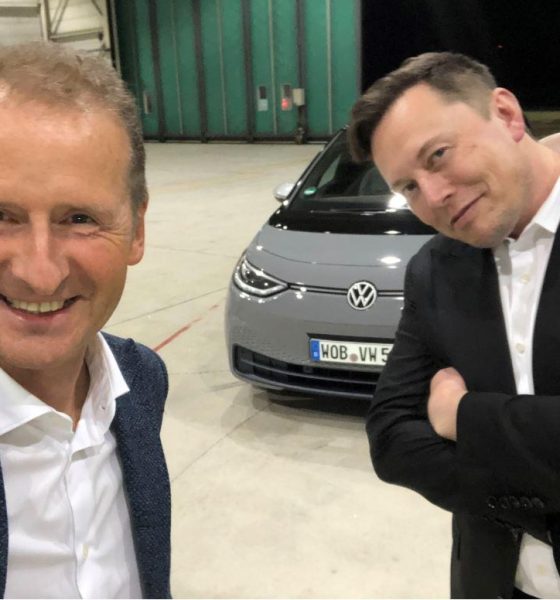

News
Tesla Battery Day vs. Volkswagen Power Day: How Wall Street reacted
Tesla’s Battery Day and Volkswagen’s Power Day were two similar events that showed how the two automakers plan to combat electric vehicle prices within the next few years. Despite the similarities in the events, Wall Street reacted quite differently to both, with Tesla (NASDAQ: TSLA) seeing a minimal effect on its stock in the days following. However, Volkswagen’s stock (OTCMKTS: VWAGY) is soaring over 12% on the day after the event.
Tesla Battery Day
Tesla’s Battery Day was a marquee event for the electric automaker. While the previous year’s focus was Autonomy, 2020 saw battery cells as Tesla’s main concentration. During the event, CEO Elon Musk revealed how Tesla would combat battery prices by continuing to source cells from third-party suppliers, but also by developing its own 4680 cells that are produced by the company in-house. Additionally, new structural battery packs are being used to house the cells and also provide a more robust crash response in the event of an accident. The rigidity of the new structural battery intends to take Tesla’s safety ratings through the roof, where they already reside.
Tesla also revealed plans for a $25,000 car, a blueprint to manufacture 20 million cars per year, and a roadmap to massive cuts in battery cell production costs.
LIVE BLOG: Tesla Battery Day and Annual Shareholder Meeting 2020 updates
Despite the developments, Tesla didn’t receive a big boost on Wall Street. Interestingly, despite the massive developments and plans that Tesla had revealed during the Battery Day event on September 22nd, 2020, the stock closed at $424.23. The day following saw an 11% drop in the stock, as it closed at $380.36.
Many didn’t understand the reason for the drop. Tesla bull and investor Jim Cramer, who was at one time bearish on the automaker’s stock, stated that the stock fell simply because Tesla didn’t announce what some were expecting. “They’re just bummed the things they hyped didn’t happen,” Cramer said. “Tesla rolls out a plan to create an electric car for the masses and greeted with a yawn because Musk didn’t roll out a magic battery. This is what happens when you let expectations get out of control.”
Volkswagen Power Day
Volkswagen’s Power Day was, in effect, the German automaker’s version of Tesla’s Battery Day. The company held an event outlining their plans for cell cost reductions, along with plans for six total production plants across Europe. VW also has established several partnerships with European energy companies to roll out an expansive charging infrastructure, among many other developments.
“We aim to reduce the cost and complexity of the battery and at the same time increase its range and performance,” Volkswagen Group Board Member for Technology Thomas Schmall said. “We will use our economies of scale to the benefit of our customers when it comes to the battery too. On average, we will drive down the cost of battery systems to significantly below €100 per kilowatt-hour. This will finally make e-mobility affordable and the dominant drive technology.”
Volkswagen’s Power Day: Six new cell plants, new unified battery cell, charging network partnerships
Volkswagen stock began Monday’s trading session at $28.38. After the developments that VW announced, the stock shot up $1.38, a boost of 4.86%. However, the German company’s stock is enjoying massive gains today, just one day after the big event. After closing at $29.76 yesterday, VW stock has increased another 3.48% at the time of writing, for a total gain of 11.69% as of 2:30 PM EST.
The differences in the presentations and how Wall Street has responded to them are unknown. However, the sheer size of Volkswagen’s production figures could be the main reason for the increased investor response. While Tesla’s rollout of 500,000 vehicles in 2020 was a company best, Volkswagen delivered 9.3 million vehicles last year. For context, VW has also been around since 1937, while Tesla has only produced a mass-market vehicle since 2017.
Tesla is undoubtedly the leader in electric vehicles. Volkswagen, while still working out software kinks, could be considered second-place by some because of the successful adaptation of the ID. family of vehicles in Europe so far. However, it is still admittedly ironing out some software issues with its MEB platform, and it seems somewhat odd that VW’s stock received such a healthy boost in the day following its Power Day event.
What do you think? What is the reasoning for the substantial difference in Wall Street’s reaction? Let us know in the comments below, or Tweet me directly.
Disclosure: Joey Klender is a TSLA Shareholder.

Cybertruck
Tesla drops latest hint that new Cybertruck trim is selling like hotcakes
According to Tesla’s Online Design Studio, the new All-Wheel-Drive Cybertruck will now be delivered in April 2027. Earlier orders are still slated for early this Summer, but orders from here on forward are now officially pushed into next year:

Tesla’s new Cybertruck offering has had its delivery date pushed back once again. This is now the second time, and deliveries for the newest orders are now pushed well into 2027.
According to Tesla’s Online Design Studio, the new All-Wheel-Drive Cybertruck will now be delivered in April 2027. Earlier orders are still slated for early this Summer, but orders from here on forward are now officially pushed into next year:
🚨 Tesla has updated the $59,990 Cybertruck Dual Motor AWD’s estimated delivery date to April 2027.
First deliveries are still slated for June, but if you order it now, you’ll be waiting over a year.
Demand appears to be off the charts for the new Cybertruck and consumers are… pic.twitter.com/raDCCeC0zP
— TESLARATI (@Teslarati) February 26, 2026
Just three days ago, the initial delivery date of June 2026 was pushed back to early Fall, and now, that date has officially moved to April 2027.
The fact that Tesla has had to push back deliveries once again proves one of two things: either Tesla has slow production plans for the new Cybertruck trim, or demand is off the charts.
Judging by how Tesla is already planning to raise the price based on demand in just a few days, it seems like the company knows it is giving a tremendous deal on this spec of Cybertruck, and units are moving quickly.
That points more toward demand and not necessarily to slower production plans, but it is not confirmed.
Tesla Cybertruck’s newest trim will undergo massive change in ten days, Musk says
Tesla is set to hike the price on March 1, so tomorrow will be the final day to grab the new Cybertruck trim for just $59,990.
It features:
- Dual Motor AWD w/ est. 325 mi of range
- Powered tonneau cover
- Bed outlets (2x 120V + 1x 240V) & Powershare capability
- Coil springs w/ adaptive damping
- Heated first-row seats w/ textile material that is easy to clean
- Steer-by-wire & Four Wheel Steering
- 6’ x 4’ composite bed
- Towing capacity of up to 7,500 lbs
- Powered frunk
Interestingly, the price offering is fairly close to what Tesla unveiled back in late 2019.
Elon Musk
Elon Musk outlines plan for first Starship tower catch attempt
Musk confirmed that Starship V3 Ship 1 (SN1) is headed for ground tests and expressed strong confidence in the updated vehicle design.

Elon Musk has clarified when SpaceX will first attempt to catch Starship’s upper stage with its launch tower. The CEO’s update provides the clearest teaser yet for the spacecraft’s recovery roadmap.
Musk shared the details in recent posts on X. In his initial post, Musk confirmed that Starship V3 Ship 1 (SN1) is headed for ground tests and expressed strong confidence in the updated vehicle design.
“Starship V3 SN1 headed for ground tests. I am highly confident that the V3 design will achieve full reusability,” Musk wrote.
In a follow-up post, Musk addressed when SpaceX would attempt to catch the upper stage using the launch tower’s robotic arms.
“Should note that SpaceX will only try to catch the ship with the tower after two perfect soft landings in the ocean. The risk of the ship breaking up over land needs to be very low,” Musk clarified.
His remarks suggest that SpaceX is deliberately reducing risk before attempting a tower catch of Starship’s upper stage. Such a milestone would mark a major step towards the full reuse of the Starship system.
SpaceX is currently targeting the first Starship V3 flight of 2026 this coming March. The spacecraft’s V3 iteration is widely viewed as a key milestone in SpaceX’s long-term strategy to make Starship fully reusable.
Starship V3 features a number of key upgrades over its previous iterations. The vehicle is equipped with SpaceX’s Raptor V3 engines, which are designed to deliver significantly higher thrust than earlier versions while reducing cost and weight.
The V3 design is also expected to be optimized for manufacturability, a critical step if SpaceX intends to scale the spacecraft’s production toward frequent launches for Starlink, lunar missions, and eventually Mars.
News
Tesla FSD (Supervised) could be approved in the Netherlands next month: Musk
Musk shared the update during a recent interview at Giga Berlin.

Tesla CEO Elon Musk shared that Full Self-Driving (FSD) could receive regulatory approval in the Netherlands as soon as March 20, potentially marking a major step forward for Tesla’s advanced driver-assistance rollout in Europe.
Musk shared the update during a recent interview at Giga Berlin, noting that the date was provided by local authorities.
“Tesla has the most advanced real-world AI, and hopefully, it will be approved soon in Europe. We’re told by the authorities that March 20th, it’ll be approved in the Netherlands,’ what I was told,” Musk stated.
“Hopefully, that date remains the same. But I think people in Europe are going to be pretty blown away by how good the Tesla car AI is in being able to drive.”
Tesla’s FSD system relies on vision-based neural networks trained on real-world driving data, allowing vehicles to navigate using cameras and AI rather than traditional sensor-heavy solutions.
The performance of FSD Supervised has so far been impressive. As per Tesla’s safety report, Full Self-Driving Supervised has already traveled 8.3 billion miles. So far, vehicles operating with FSD Supervised engaged recorded one major collision every 5,300,676 miles.
In comparison, Teslas driven manually with Active Safety systems recorded one major collision every 2,175,763 miles, while Teslas driven manually without Active Safety recorded one major collision every 855,132 miles. The U.S. average during the same period was one major collision every 660,164 miles.
If approval is granted on March 20, the Netherlands could become the first European market to greenlight Tesla’s latest supervised FSD (Supervised) software under updated regulatory frameworks. Tesla has been working to secure expanded FSD access across Europe, where regulatory standards differ significantly from those in the United States. Approval in the Netherlands would likely serve as a foundation for broader EU adoption, though additional country-level clearances may still be required.








